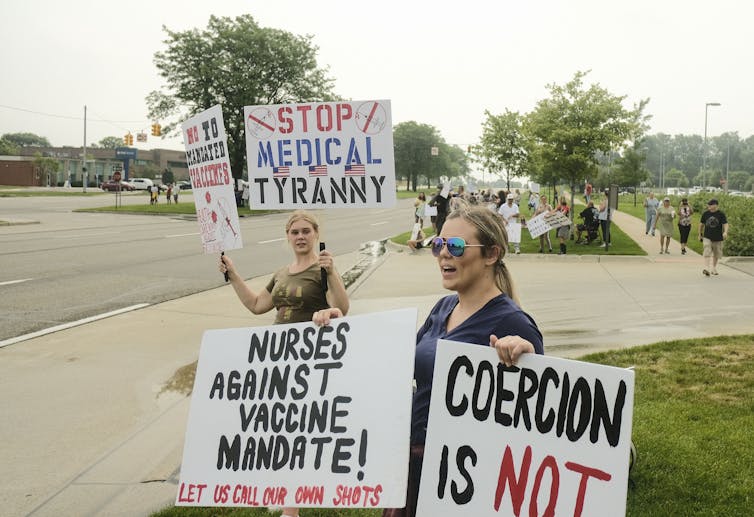The big idea
Children of nurses who identify as Republican are less likely to receive a COVID-19 vaccination compared with children of nurses who identify as Democrat, according to our recently published study in the Journal of Community Health.

We surveyed more than 1,000 nurses in South Dakota in June and July of 2022. Of those, 298 participants reported having children 5 to 17 years old. We asked this group about the vaccination status of their children and found that the children of nurses who identified as Democrats had a 13% higher probability of being vaccinated compared with the offspring of nurses who identified as Republican.
The timing of our survey only allowed us to measure the vaccination intention of parents of children from 6 months to 4 years old, since authorization of COVID-19 vaccines for that age group occurred just days before the survey. Of the 123 nurses who reported having children 6 months to 4 years old, those who identified as Democrats had a 14% higher probability of intending to vaccinate their children compared to self-identified Republicans.
Additionally, we found that those nurses who received a COVID-19 booster dose were more likely to vaccinate their children. On the other hand, gender, education and type of nursing credential had no effect.
Why it matters
Since the start of the COVID-19 pandemic, vaccination for children has been a contentious issue. In our study, we found that polarization among nurses split along political party lines in a similar fashion to the general public.
Despite the wide availability of safe and free COVID-19 vaccines for children and adolescents in the U.S., vaccination rates for people under age 18 are lower than for adults. As of Nov. 30, 2022, more than 60% of children remain unvaccinated.
Though children tend to be more resilient to COVID-19, there are still significant risks. The Centers for Diseases Control and Prevention has reported more than 1,500 deaths of children under 18 from COVID-19, as of late November 2022. And children are susceptible to “long” COVID symptoms as well.
Nurses – and other health care workers – are at the forefront of efforts to contain COVID-19. They also advise patients who are deciding whether to vaccinate themselves and their families. Our study shows that among nurses, political partisanship appears to influence their attitudes toward vaccinating their own kids.
Public health officials are striving to boost COVID-19 vaccination rates. Yet the politicization of the pandemic continues to hinder these efforts.

SOPA Images/LightRocket via Getty Images
Increasing vaccination rates among children will also protect the most vulnerable members of society, such as older adults and people with weakened immune systems. Nevertheless, some parents continue to resist vaccinating their children.
Our study shows that parents make COVID-19 vaccination decisions for the entire family. We found that nurses who received a booster dose of a COVID-19 vaccine are more likely to vaccinate their children and adolescents. However, the nurses who haven’t received a booster dose are far less likely to vaccinate their children.
What other research is being done
Our findings align with other research carried out by ourselves and others that shows the strong influence of partisan self-identification on COVID-19 attitudes and behaviors.
Other studies we’ve done show that Republicans are less likely than Democrats to receive a COVID-19 vaccination and are less likely to support mandatory COVID-19 vaccination. We also found that nurses who identify as Republican are less likely to receive a COVID-19 booster dose.
Our study joins a growing body of work that seeks to explore the factors behind COVID-19 vaccine hesitancy among health care workers. Other studies have linked race and ethnicity, as well as trust in government, physicians and pharmaceutical companies, to the attitudes of health care workers toward COVID-19 vaccination.
What’s next
Given the politicization of the pandemic and the erosion of trust in authorities, it’s important that messages encouraging the vaccination of children come from trusted sources.
Our previous research suggests that religious leaders can help encourage compliance with COVID-19 prevention measures. In the future, we plan to investigate whether endorsements from trusted community leaders could convince parents to vaccinate their children.
Filip Viskupič, Assistant Professor of Political Science, South Dakota State University and David Wiltse, Associate Professor of Political Science, South Dakota State University
This article is republished from The Conversation under a Creative Commons license. Read the original article.
















